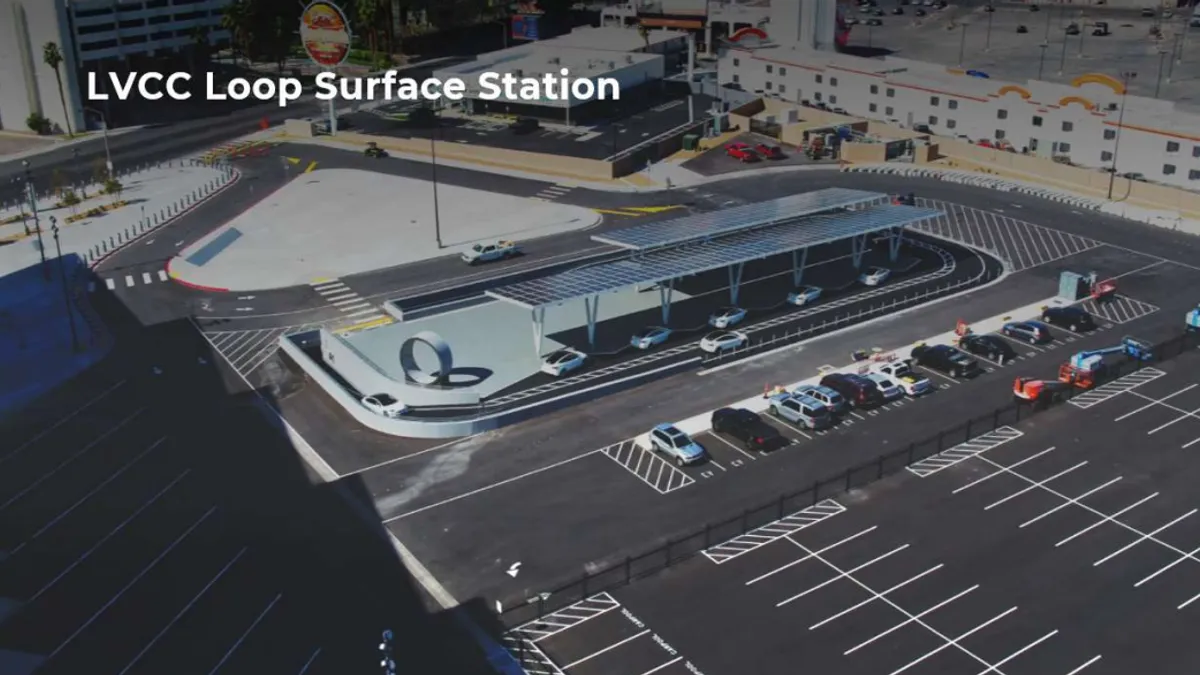Dive Brief:
- Both tunneling and bureaucracy can be a slow, arduous grind. Last week, The Boring Co. inched past another milestone, when the Las Vegas City Council unanimously approved an agreement with the Elon Musk-owned company.
- The deal permits Boring to build, own and operate underground tunnels beneath the Strip. The company will fund the project completely with its own money, though private stakeholders — such as hotels — will pay for the stops on their property.
- The Loop project secured approval from Clark County in October. The project will stretch more than 34 miles with at least 55 stops.
Dive Insight:
The City Council’s vote concerns just five stations directly beneath the downtown area. Next, Boring will need to secure approval of development design studies, including fire and safety, geological and drainage reports.
Passengers will board most of those stations above ground (pictured above), according to Mike Janssen, executive director of infrastructure for the City of Las Vegas. Below-ground stations may populate sections of the route, but cost far more than those above ground. At surface-level stations, cars would emerge from and enter tunnels from ramps, picking up passengers in between.
Before the vote, The Boring Company’s President Steve Davis expressed optimism about the project timeline, calling the approval step two of eight.
“There’s a long way to go. There’s a lot of work to do,” Davis said to the City Council. “So, if I had to guess on the spot, I would guess we have machines in [the ground] next calendar year. But there’s a lot of work to be done, and this is hopefully a key next step.”
The 50-year, non-exclusive agreement will give Boring the right of way to operate and maintain the project privately, Janssen told the City Council.
The Boring business model uses Tesla vehicles — driven by humans and not self-driving, as previously reported — through tunnels to transport passengers. Tuesday, Musk addressed plans to cut 10% of the electric vehicle company’s salaried workers over the next three months. Musk called the trimming of 6,000 salaried employees, or about 3% of the company, “not super material,” the Wall Street Journal reported. The company cited overstaffing for the layoffs.
Boring already tunneled a smaller loop slightly longer than a mile beneath the Las Vegas Convention Center as a proof of concept, and the company’s first commercial project.
Tesla Model X and Y vehicles fill those tunnels — as they will the entire Loop project when finished — whisking passengers across the convention center from below. Boring designed the tunnels to greatly trim the 25 minute walk to a matter of moments.
The Las Vegas Convention and Visitors Authority footed the roughly $52 million bill for that tunnel.
Since its completion, the company has pitched not only its expansion, but new tunnels in cities like Miami. In March, San Antonio’s Alamo Regional Mobility Authority voted to select Musk’s firm for a potential San Antonio International Airport-to-downtown loop at a cost of $247 million to $289 million.
Nevertheless, its efforts in the greater Las Vegas area continue to be The Boring Company’s marquis.














